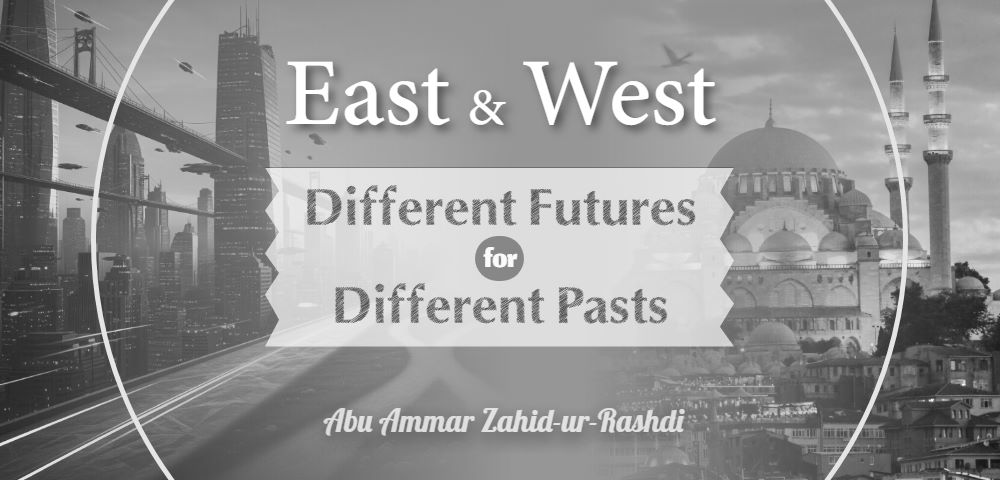East and West: Different Futures for Different Pasts
In this context, our complaint to the West is that it is making an unjust attempt to impose its specific historical context on the whole world, especially on Muslims. It is trying to force us to abandon our bright past by showing us its own dark past.
(الشریعہ — ستمبر ۲۰۲۵ء)
الشریعہ — ستمبر ۲۰۲۵ء
جلد ۳۶ ، شمارہ ۹
مدنی مسجد اسلام آباد کا معاملہ
مولانا ابوعمار زاہد الراشدی
ادارہ الشریعہ
مسجد گرانے کے متعلق چند اہم اصولی سوالات
ڈاکٹر محمد مشتاق احمد
اکیسویں صدی میں تصوف کی معنویت اور امکانات
مولانا شاہ اجمل فاروق ندوی
خطبہ حجۃ الوداع اغیار کی نظر میں
مولانا حافظ واجد معاویہ
شہیدِ کربلا حضرت امام حسین رضی اللہ تعالیٰ عنہ کی مظلومانہ شہادت
مولانا محمد طارق نعمان گڑنگی
خادمۂ رسول ؐحضرت امِ رافع سلمٰیؓ
مولانا جمیل اختر جلیلی ندوی
سوشل میڈیا کے منفی استعمال کے نتائج
مولانا مفتی عبد الرحیم
خواتین کا مسجد میں باجماعت نماز ادا کرنا
ڈاکٹر محمد عمار خان ناصر
خطبہ، تقریر اور نمازِ جمعہ میں لاؤڈ اسپیکر کا غلط استعمال
مفتی سید انور شاہ
کُل جماعتی دفاعِ شعائر اللہ سیمینار: اعلامیہ، سفارشات، قراردادیں
قرآن و سنہ موومنٹ پاکستان
غزہ پر اسرائیل کا نیا حملہ: فلسطین کا مستقبل کیا ہو گا؟
ڈاکٹر محمد غطریف شہباز ندوی
East and West: Different Futures for Different Pasts
مولانا ابوعمار زاہد الراشدی
’’خطباتِ فتحیہ: احکام القرآن اور عصرِ حاضر‘‘ (۳)
مولانا ابوعمار زاہد الراشدی
مولانا ڈاکٹر محمد سعید عاطف
حدیث میں بیان کی گئی علاماتِ قیامت کی تاریخی واقعات سے ہم آہنگی، بائیبل اور قرآن کی روشنی میں (۴)
ڈاکٹر محمد سعد سلیم
’’اسلام اور ارتقا: الغزالی اور جدید ارتقائی نظریات کا جائزہ‘‘ (۷)
ڈاکٹر شعیب احمد ملک
ڈاکٹر ثمینہ کوثر
ماہانہ بلاگ
بونیر میں امدادی سرگرمیاں اور مدارس کے طلباء
مولانا مفتی فضل غفور
مولانا عبد الرؤف محمدی
اسلام ایک عالمی مذہب کیسے بنا؟
ایپک ہسٹری
پاکستان اور عالمِ اسلام: فکری و عملی رکاوٹیں کیا ہیں؟
عبد اللہ الاندلسی
پال ولیمز
ردِ عمل پر قابو پانے کی ضرورت
محسن نواز
غزہ کو بھوکا مارنے کے اسرائیلی اقدامات کو کیسے روکا جائے؟
الجزیرہ
گلوبل صمود فلوٹیلا: غزہ کی جانب انسانی ہمدردی کا سمندری سفر
ادارہ الشریعہ
صمود (استقامت) فلوٹیلا میں پاکستان کی نمائندگی
مولانا عبد الرؤف محمدی
فلسطینی ریاست کی ممکنہ تسلیم کا برطانوی فیصلہ اور اس کی مخالفت
ادارہ الشریعہ
فلسطین کے متعلق آسٹریلیا اور دیگر مغربی ممالک کا بدلتا ہوا رجحان: ایک مذاکرہ کی روئیداد
اے بی سی نیوز آسٹریلیا
’’سیرتِ مصطفیٰ ﷺ (۱)‘‘
حضرت مولانا محمد ادریس کاندھلویؒ
مولانا ڈاکٹر حافظ ملک محمد سلیم عثمانی
’’مطالعۂ سیرتِ طیبہ ﷺ : تاریخی ترتیب سے‘‘
ڈاکٹر حافظ سید عزیز الرحمٰن
’’اکبر بنام اقبال: ایک صدی کے بعد 133 غیرمطبوعہ خطوط کی دریافت‘‘
ڈاکٹر زاہد منیر عامر
’’فہمِ اقبال — کلامِ اقبال کا موضوعاتی انتخاب‘‘
رانا محمد اعظم

